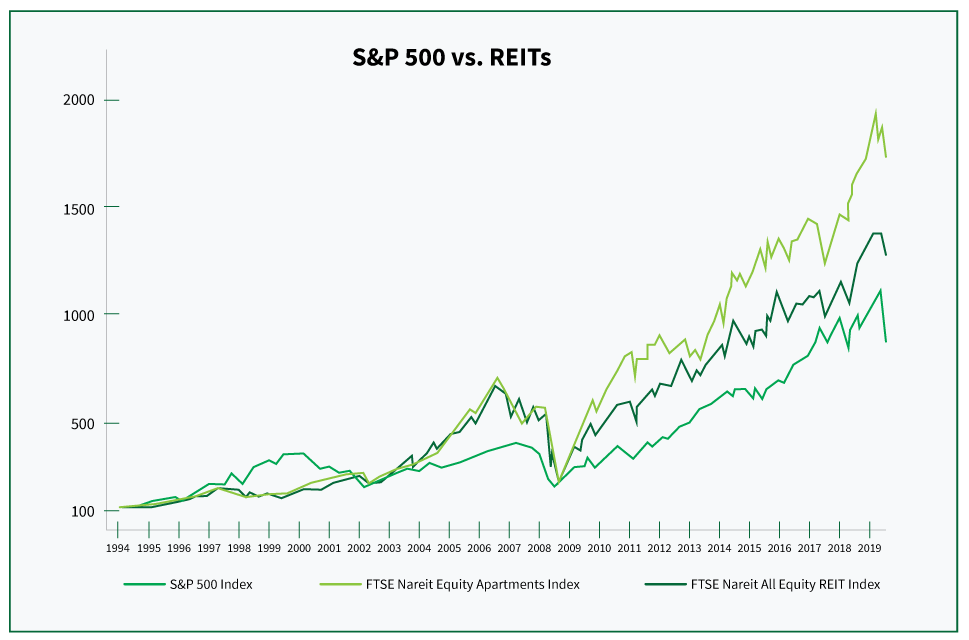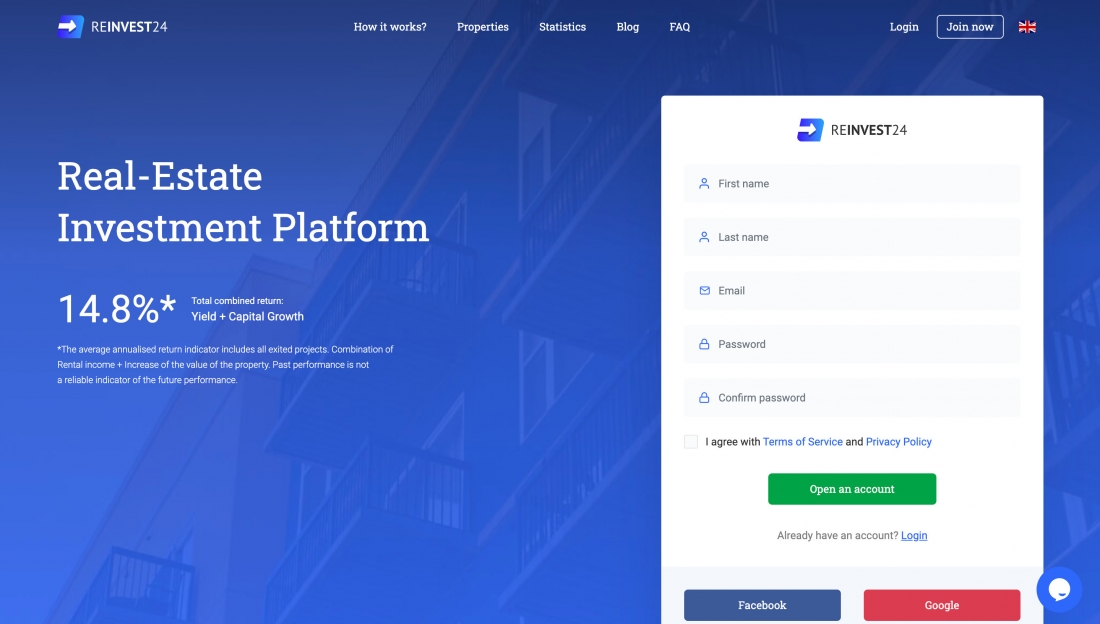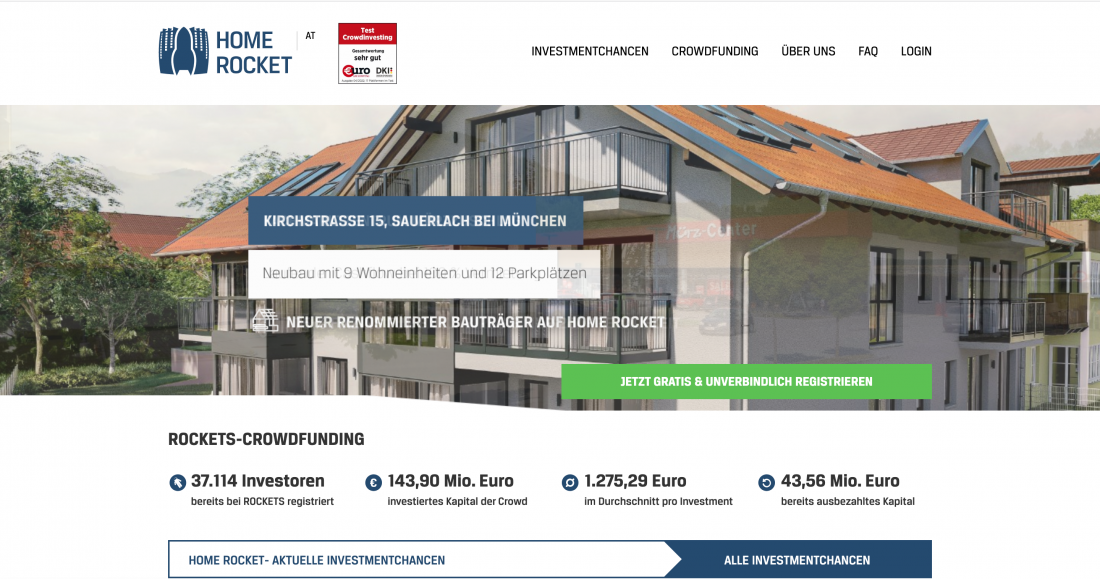Real estate crowdfunding vs REITs

Real estate investment has always been among the most lucrative investment opportunities. Most investors try to dedicate at least a part of their portfolio to real estate deals to diversify and strengthen it. After all, the land is a limited resource while people constantly need it for vital everyday purposes. Since it’s in high demand today, various investment models are available.
In this article, we’ll look at the two popular property investment opportunities: REIT, real estate investment trust, and real estate crowdfunding. The latter is a relatively new phenomenon, yet, it has proven to be a worthy competitor to the long-existent REITs.
While both alternatives may share a similar principle behind them, we’ll discuss some distinctive features below.
What is a REIT?
A real estate investment trust, commonly referred to as “REIT”, is a real estate investment opportunity that appeared in the 1960-s. Essentially, it’s an organisation that owns a property and rents it out to tenants. It can be an apartment or office building, retail outlet, hotel, commercial centre etc. Investors can purchase a REIT share and receive steady returns from the rent that tenants pay back to the REIT.
How does real estate investment trust work?
Investors prefer REITs since they have a long track record and have proven to be reliable. In addition, it’s a relatively liquid asset, which can be sold anytime.

While investors’ interest in REITs is rather understandable, what about REITs themselves?
It turns out that through REITs, large corporations can apply for tax breaks. To be eligible, they must distribute no less than 90% of their profits to the shareholders. Substantially lower taxation is one the main reasons why organisations set up REITs and are willing to distribute their shares. One should also emphasise that starting and running a REIT is an intricate business. To present any shareholder value, REITs must have deep real estate experience and a network to manage the property.
On the whole, REITs offer the following advantages:
- diversification. Yes, again. Spoiler: it’s not the last time we will resort to this point. REITs are less vulnerable to market fluctuations and are not as volatile as stocks. Besides, you can diversify geographically with REITs, choosing more stable and promising markets. While foreign investors can’t own any property in some countries, REITs allow acquiring partial ownership.
- steady and fairly good returns to build your passive income.
- liquidity. Unlike other investment opportunities, selling your REIT share is quite simple.
As to the disadvantages, there are such factors to bear in mind:
- REIT dividends are usually taxed at a higher rate. Generally, dividends are regarded as a capital gain and are taxed at a regular income rate. REIT profits, on the other hand, don’t fall under this category.
- REIT investing works best as a long-term investment strategy, so if you know that you may need your money within the coming few years, it’s better to explore other options.
What is real estate crowdfunding?
Now that we’ve got familiar with the REIT mechanism, it’s time to proceed with real estate crowdfunding.
Firstly, real estate crowdfunding platforms offer a lower investment threshold so that a larger number of investors can participate. Secondly, many investment experts advise including real estate into a portfolio to diversify it. Any investment indeed carries the risk of losing the funds. Still, property crowdfunding is considered to be a relatively less risky venture. To be precise, there are simply more ways to mitigate the risks.
Unlike REITs, real estate crowdfunding platforms allow investors to select the property they will fund. They are also free to choose multiple property types, be it an office building or an apartment block, while REITs usually work with one property type.
In a nutshell, here are the pros of real estate crowdfunding:
- access to the real estate market with a smaller investment amount;
- chance to work with real estate management directly without any third parties involved;
- while you don’t participate in the day-to-day management process, you can hold the right to vote when it comes to major decisions, such as property sales;
- rich property choice.
Nonetheless, there are also cons to be aware of:
- poor liquidity and no secondary market: the selling opportunities are restricted;
- even though experts recommend including a real estate loan into your portfolio as a way to strengthen it, the risk of losing the investment isn’t going anywhere. If the market declines, the chances of losing the money rise correspondingly.
- in many cases, you must be an accredited investor to invest in a real estate loan.
If you are leaning toward property crowdfunding, below, we’ll list some of the top real estate crowdfunding providers to get a better idea of the available resources.

Top property crowdfunding platforms
Reinvest24
Reinvest24 is one of the leaders among European property crowdfunding platforms based in Estonia. It offers equity-based loans and rental deals focusing on pre-qualified residential and commercial properties in Germany, Spain, Moldova, Switzerland, and the Baltic countries.

It’s been more than four years on the market. During this timeline, Reinvest24 have accumulated over €25m with zero default rate and an average yield of 15% per year.
The platform has established a specific pre-screening process for all the properties to ensure due quality. Reinvest24 also prioritise customer service and have recently launched a special bonus program.
EstateGuru
EstateGuru is a real estate P2P platform based in Estonia that has grown into one of the largest real estate crowdfunding providers. It has funded over 500 loans with only one default and has been labelled as a Good Practice Label by Finance Estonia.

The projects offered by EstateGuru are property-backed and are secured by the first-rank mortgage. It’s best suited for investors looking for long-term loans and who are fine with having their funds locked for at least 12 months. Should you prefer to exit the loan earlier, there is a 35% fee applicable.
CapitalRise
CapitalRise is one of the top UK award-winning property crowdfunding platforms providing prime property loans across the country. Chelsea, Belgravia, Oxford, Surrey – are among the most iconic locations.

It aims to disrupt the old real estate investment approach and give access to the finest quality property without any middlemen involved. With a minimum investment of £1,000, CapitalRise allows earning 8%-12% per year.
You can also leverage your IFISA, Innovative Finance Individual Savings Account, to receive your tax-free returns.
Home Rocket
Home Rocket is a real estate crowdfunding platform headquartered in Austria that allows investing in real estate loans across Austria and Germany. It works with experienced real estate developers and has all the projects appraised by an independent expert.

The minimum investment amount is as little as €250. The platform’s mission is to make the real estate market accessible to everyone. Home Rocket team believes that since having a roof over a head is one of the most basic human needs, the privilege of contributing to the real estate market should not be reserved only for high-net individuals.
Bottom line
Real estate investment can generate robust steady returns without all the responsibility of owning and managing the property which is fairly considered to be a full-time job.
Both REITs and real estate crowdfunding platforms spare all the hassle while providing opportunities for lucrative returns. Just like with many other investment options, it all comes down to the risk you are willing to take and the yield you are ultimately willing to receive. Remember, the higher the risk, the higher reward.
Hopefully, the info above will help you make well-informed decisions, choose reliable real estate crowdfunding platforms, and grow your investment portfolio!





